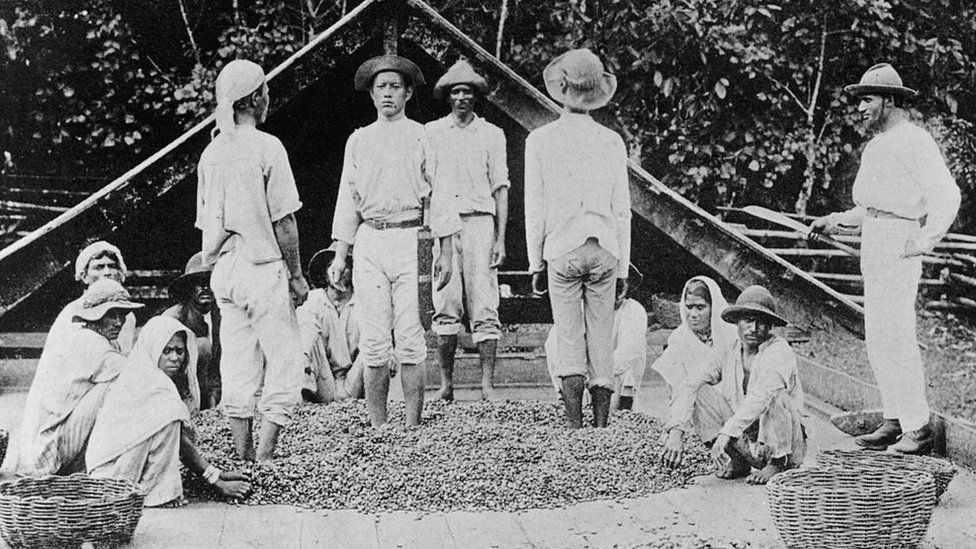Trinidad and Tobago profile - Timeline
- Published

A chronology of key events:
1498 - Christopher Columbus visits the islands, naming Trinidad after the three peaks at its south-east corner and Tobago after a local type of tobacco pipe.
1597: Spanish rename original settlement "Puerto de Espana"
1532 - Spain colonises Trinidad, appointing a governor to rule it.
1630s - The Dutch settle on Tobago and plant sugar-cane.
1781 - The French capture Tobago from the Spanish, transforming it into a sugar-producing colony.
British rule
1797 - A British naval expedition captures Trinidad from Spain.
1802 - Spain cedes Trinidad to Britain under the Treaty of Amiens.
1814 - France cedes Tobago to Britain.
1834 - Slavery abolished; indentured workers brought in from India to work on sugar plantations.
1889 - Trinidad and Tobago administratively combined as a single British colony.
1945 - Universal suffrage instituted.
1956 - Eric Williams, a moderate nationalist, founds the People's National Movement (PNM).
1958 - Trinidad and Tobago joins the British-sponsored West Indies Federation.
1959 - Britain gives Trinidad and Tobago internal self-government with Williams as prime minister.
1962 - Trinidad and Tobago leaves the West Indies Federation; becomes independent with Williams as prime minister.
1967 - Trinidad and Tobago joins the Organisation of American States.
1968 - Trinidad and Tobago and other English-speaking Caribbean states form the Caribbean Free Trade Area, which was replaced in 1973 by the Caribbean Common Market.
Domestic unrest
1970 - Government declares a state of emergency after violent protests by "Black Power" supporters who demand a solution to unemployment and an end to foreign influence over the economy. Hundreds of army soldiers mutiny in support, but their rebellion collapses within days.
1972 - State of emergency lifted.
1975 - Strikes by workers in the oil, sugar, transport and electricity sectors paralyse the economy.
1976 - Trinidad and Tobago becomes a republic with the former governor-general, Ellis Clarke, as president and Eric Williams as prime minister.
1980 - A rash of firebombings, arsons and political shootings afflict the country.
1981 - Agriculture Minister George Chambers becomes prime minister following Williams' death.
1986 - Tobago-based National Alliance for Reconstruction (NAR) headed by Arthur Robinson wins the general election.
1987 - Noor Hassanali becomes president.
1990 - More than 100 Islamist radicals blow up the police headquarters, seize the parliament building and hold Robinson and other officials hostage for several days in an abortive coup attempt.
1991 - Patrick Manning becomes prime minister after his PNM party wins general election.
1995 - Indian-based United National Congress (UNC) and NAR form coalition with Basdeo Panday as prime minister.
1999 - Capital punishment restored.
2000 - Basdeo Panday wins another term in general elections.
Political deadlock
2001 December - General election yields an unprecedented tie, with the governing party and main opposition winning 18 seats each.
2002 April - Prime Minister Patrick Manning requests parliament be suspended amid continuing deadlock over tied elections.
2002 October - Third general election in three years ends months of political deadlock. Prime Minister Patrick Manning's ruling People's National Movement declares victory.
2003 March - President Maxwell Richards is sworn in after being elected by MPs in February.
2003 August - State-owned sugar company Caroni shuts down with the loss of more than 8,000 jobs.
2005 April - Regional leaders gather to inaugurate the Trinidad-based Caribbean Court of Justice, a final court of appeal intended to replace Britain's Privy Council. The court hears its first case in November.
2005 October - At least 10,000 people take part in a protest - named the Death March - against a soaring rate of violent crime.
2006 April - Former Prime Minister Basdeo Panday is sentenced to two years in prison for failing to declare an overseas bank account while he was in office. The conviction is quashed on appeal.
2007 January - Plans are announced to close the centuries-old sugar industry. Production had been hit by cuts in European subsidies.
2007 November - The governing People's National Movement is re-elected.
2007 December - Former Prime Minister Basdeo Panday is committed to stand trial over corruption charges relating to a construction project at Trinidad and Tobago's main airport.
2008 April - Mr Panday is ordered to face a retrial regarding false financial declarations made between 1997 and 1999.
2010 May - People's Partnership coalition wins snap elections. Kamla Persad-Bissessar becomes country's first female prime minister.
2011 August - State of emergency imposed, with an overnight curfew in six crime "hotspots", following a spike in violent crime.`
2011 November - Prime Minister Kamla Persad-Bissessar says the security forces have uncovered a plot by "criminal elements" to assassinate her and several government ministers.
2013 March - Mr Justice Anthony Carmona is elected president.
2013 June - Chinese President Xi Jinping visits for talks on energy.
2015 May - Jack Warner, a Trinidadian politician and businessman, is one of a number of senior executives from world football's governing body, FIFA, charged by the US with racketeering, fraud and money laundering.